Copyright 2011 by Rick Auger
First Skyhorse Publishing edition 2014
All rights reserved. No part of this book may be reproduced in any manner without the express written consent of the publisher, except in the case of brief excerpts in critical reviews or articles. All inquiries should be addressed to Skyhorse Publishing, 307 West 36th Street, 11th Floor, New York, NY 10018.
Skyhorse Publishing books may be purchased in bulk at special discounts for sales promotion, corporate gifts, fund-raising, or educational purposes. Special editions can also be created to specifications. For details, contact the Special Sales Department, Skyhorse Publishing, 307 West 36th Street, 11th Floor, New York, NY 10018 or .
Skyhorse and Skyhorse Publishing are registered trademarks of Skyhorse Publishing, Inc., a Delaware corporation.
Visit our website at www.skyhorsepublishing.com.
10 9 8 7 6 5 4 3 2 1
Library of Congress Cataloging-in-Publication Data is available on file.
Cover design by Scott Van Atta
Print ISBN: 978-1-62914-564-8
Ebook ISBN: 978-1-63220-115-7
Printed in the United States of America
Contents
Preface
D uring my first year as an enthusiastic but raw school psychologist, I was having trouble figuring out how best to help a very unmotivated and low-energy eighth grader. The students strong test scores belied his poor classroom performance, and even though he just sat in his desk doing virtually nothing in class, he seemed to care about his grades. I was muddling around trying to find the right set of rewards and academic interventions that would light a fire under him, and I was not having much success.
What finally turned things around and led to an approach that was more useful was a conversation I had with the school counselor, who had just met with the student. I think hes depressed, she stated. I wonder if all the rest of his school issues revolve around that. That made very good sense, and jointly we worked with the students teachers and parents to devise some appropriate interventions to better support the boy. This case was an early and tremendously valuable lesson on the importance of recognizing and appreciating the mental health needs of studentsand of the critical role school counselors can play in providing appropriate support to students with mental health needs.
While this book is primarily intended to be read by school counselors, the true beneficiaries are the thousands of students in schools across the country who have mental health needs that interfere with their school success and their well-being. School counselors are in a unique position to assist students by helping teachers create better classroom environments for students with mental health needs, by providing supportive individual and group counseling services, and by working together with families to make appropriate referrals and create networks of support. The intent of this book is to provide school counselors with a foundation of information about mental health disorders, as well as an array of intervention tools and strategies, to help students with mental health needs be more successful in school.
Some administrators and parentsand even some school counselorsmay question whether it is a proper role of the school counselor to become involved with students with mental health problems. After all, students with mental health needs often have complex and very challenging problems. In my view, the intricacy and gravity of the problems is all the more reason for school counselors to be involved. The American School Counselor Association, in its position statement on the role of school counselors vis--vis students with mental health needs, notes that unmet mental health needs can serve as substantial barriers to the personal, social, academic, and career development of students and states that school counselors are committed to helping all students, including students with mental health needs, achieve their potential (American School Counselor Association, 2009). The position statement outlines a number of ways school counselors can assist students with mental health needs, including providing appropriate referrals to out-of-school resources, advocating in the school and community for access to appropriate mental health services, and providing short-term crisis intervention and counseling. The ensuing chapters in this book provide a number of ideas and strategies to help school counselors carry out these tasks.
It is important to note that school counselors should not be expected to serve as the sole providers of counseling services for students with mental health needs or to function as mental health counselors. Ideally, school counselors should work in tandem with community mental health counselors to provide services. Even in the absence of involvement from community mental health counselors, however, school counselors cannot be expected to provide in-depth, intense individual counseling services to any student. Neither is it a good idea for school counselors to take the view that they have nothing to offer students with mental health needs. These are students who need all the help they can getand school counselors have much to offer them. In the absence of school counselor involvement, teachers and other school personnel are left to manage students with mental health needs on their own, with much less training in the area of childrens mental health than school counselors receive. My hope is that this book can provide school counselors with ideas and tools to help them better serve students with mental health needs.
Acknowledgments
w e gratefully acknowledge the contributions of the following reviewers:
Carol Cox
Guidance Counselor
Willis Elementary
Willis, Virginia
Katie DeHope
Sixth- and Seventh-Grade Counselor
Malibu High School
Malibu, California
Steve Hutton
Educational Consultant
Elementary School Principal
Area Coordinator of the Highly Skilled Educator Program
Kentucky Department of Education
Villa Hills, Kentucky
Marian White-Hood
Principal (Retired)
Ernest Just Middle School
Mitchellville, Maryland
About the Author
 Rick Auger, PhD, has been involved in the field of childrens mental health for over 25 years. Auger was a school psychologist in an urban school district for 14 years, working with hundreds of students with mental health problems. He also worked as a predoctoral intern in several outpatient mental health clinics, providing mental health services to children, adults, and families. Since 2000, Auger has been a faculty member in the Department of Counseling and Student Personnel at Minnesota State University, Mankato, where he specializes in childrens mental health and the training of school counselors. Auger is a frequent presenter at state, regional, and national conferences and has published articles in a number of national journals. He is also involved in research centering on childrens mental health, childrens career development, and school counseling issues. Auger has served as editor of Professional School Counseling, the flagship journal of the American School Counselor Association, and has served on the editorial boards of several counseling-related journals.
Rick Auger, PhD, has been involved in the field of childrens mental health for over 25 years. Auger was a school psychologist in an urban school district for 14 years, working with hundreds of students with mental health problems. He also worked as a predoctoral intern in several outpatient mental health clinics, providing mental health services to children, adults, and families. Since 2000, Auger has been a faculty member in the Department of Counseling and Student Personnel at Minnesota State University, Mankato, where he specializes in childrens mental health and the training of school counselors. Auger is a frequent presenter at state, regional, and national conferences and has published articles in a number of national journals. He is also involved in research centering on childrens mental health, childrens career development, and school counseling issues. Auger has served as editor of Professional School Counseling, the flagship journal of the American School Counselor Association, and has served on the editorial boards of several counseling-related journals.
This book is dedicated to the two sets of people who bookend my life: my parents, John and Martha Auger, and my sons, Jamie and Alex.

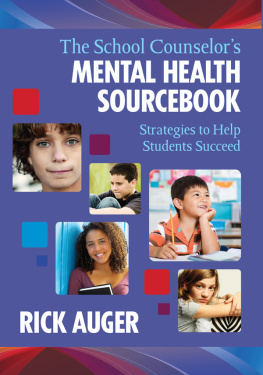

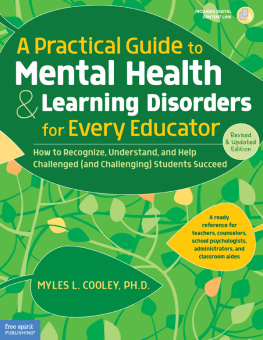

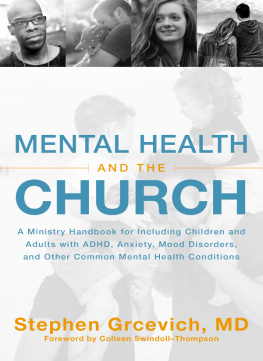


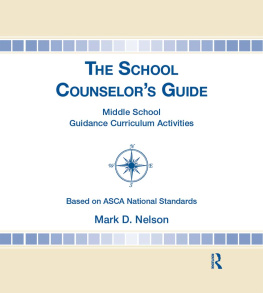
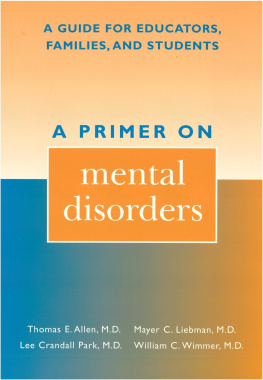


 Rick Auger, PhD, has been involved in the field of childrens mental health for over 25 years. Auger was a school psychologist in an urban school district for 14 years, working with hundreds of students with mental health problems. He also worked as a predoctoral intern in several outpatient mental health clinics, providing mental health services to children, adults, and families. Since 2000, Auger has been a faculty member in the Department of Counseling and Student Personnel at Minnesota State University, Mankato, where he specializes in childrens mental health and the training of school counselors. Auger is a frequent presenter at state, regional, and national conferences and has published articles in a number of national journals. He is also involved in research centering on childrens mental health, childrens career development, and school counseling issues. Auger has served as editor of Professional School Counseling, the flagship journal of the American School Counselor Association, and has served on the editorial boards of several counseling-related journals.
Rick Auger, PhD, has been involved in the field of childrens mental health for over 25 years. Auger was a school psychologist in an urban school district for 14 years, working with hundreds of students with mental health problems. He also worked as a predoctoral intern in several outpatient mental health clinics, providing mental health services to children, adults, and families. Since 2000, Auger has been a faculty member in the Department of Counseling and Student Personnel at Minnesota State University, Mankato, where he specializes in childrens mental health and the training of school counselors. Auger is a frequent presenter at state, regional, and national conferences and has published articles in a number of national journals. He is also involved in research centering on childrens mental health, childrens career development, and school counseling issues. Auger has served as editor of Professional School Counseling, the flagship journal of the American School Counselor Association, and has served on the editorial boards of several counseling-related journals.